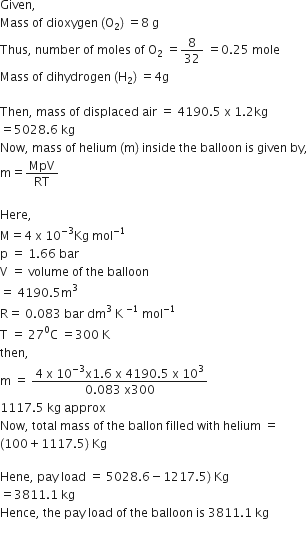 Short Answer Type
Short Answer TypeNitrogen and chlorine have the same electronegativity but only former shows intermolecular hydrogen bonding. Discuss.
 Long Answer Type
Long Answer TypeGive reasons for the following:
(i) The density of water is maximum at 277 K (4°C).
(ii) Why glycerol (glycerine) is more viscous than ethyl alcohol?
 Short Answer Type
Short Answer TypeCalcualte the total pressure in a mixture of 8 g of dioxygen and 4 g of dihydrogen confined in a vessel of 1 dm3 at ![]() . R = 0.083 bar dm3 K-1 mol-1.
. R = 0.083 bar dm3 K-1 mol-1.

A mixture of dihydrogen and dioxygen at one bar pressure contains 20% by weight of dihydrogen. Calculate the partial pressure of dihydrogen.
 Multiple Choice Questions
Multiple Choice QuestionsIf average velocity of a sample of gas molecules at 300 K is 5 cm s-1, what is RMS velocity of same sample of gas molecules at the same temperature? (Given, α: u: v = 1:1.224: 1.127)
6.112 cm/s
4.605 cm/s
4.085 cm/s
5.430 cm/s
